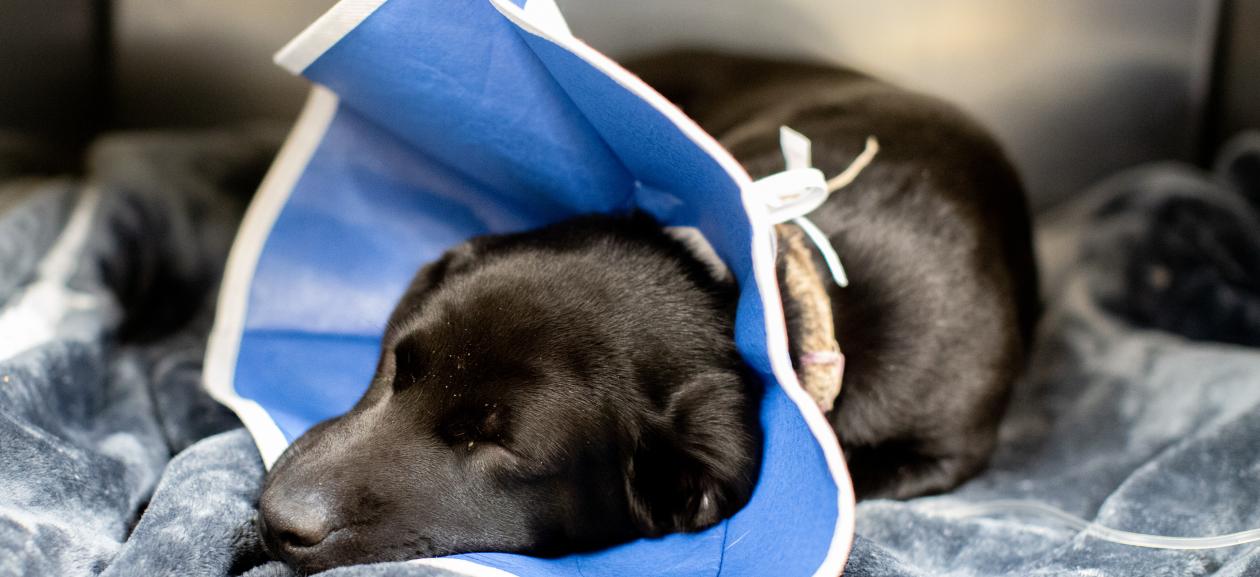
Understanding the Atypical Canine Respiratory Strain: A Guide for Pet Owners
As you may have seen in the news, an atypical strain of canine respiratory disease has been circulating among our dogs. Laboratory testing has proved inconclusive so far for the causal agent, viral or bacterial, but clinics in Oregon and across the country are working to collect samples to help identify the strain.
We do not want pet owners to panic and instead remain cautious at this time. Be informed about the symptoms, potential risks, and the available resources you have at your disposal.
Understanding This Canine Respiratory Strain:
This unique canine respiratory strain has been identified in various incidents across the country, including by the Oregon Department of Agriculture (ODA) which has received more than 200 case reports from veterinarians since August 2023. While the situation is being closely monitored, pet owners play a crucial role in recognizing potential symptoms early on. At DoveLewis, we've seen cases where it presents like:
- Mild to moderate inflammation of the trachea that lasts longer than typical canine respiratory diseases like kennel cough, and are minimally or not responsive to antibiotics.
- Chronic pneumonia that is minimally or not responsive to antibiotics.
- Acute pneumonia that rapidly becomes severe in as little as 24 to 48 hours.
Common Symptoms to Look Out For:
- Coughing: Keep an ear out for prolonged bouts of coughing, especially if they seem more frequent or severe than usual.
- Nasal Discharge: Watch for any unusual discharge from your dog's nose, which may be a sign of respiratory distress.
- Lethargy and Reduced Activity: A noticeable decrease in energy levels and enthusiasm for play could indicate a potential respiratory concern.
- Labored Breathing: If your dog exhibits difficulty breathing or rapid breathing, it's crucial to seek veterinary attention promptly.
Preventive Measures:
- Vaccination: Consult your veterinarian about the most up-to-date vaccinations like canine influenza, Bordetella, and parainfluenza to shield your pet from respiratory illnesses.
- Decrease Contact with Other Dogs: Those who frequently come into contact with other dogs are at greater risk of respiratory diseases. Be cautious in areas where there may be a lot of dogs like dog parks, groomers, doggy daycares, etc. Don't let your dogs drink out of communal water bowls. Young or senior dogs or those that have a preexisting lung or heart disease are at greater risk and you should remain cautious about interacting with other dogs.
- Isolation when Sick: If your pet shows any symptoms, isolate them from other animals to prevent the spread of the disease.
Resources for Pet Owners:
Stay informed and take action promptly if you notice any concerning symptoms in your pet. Here are resources to guide you:
- Consult Your Veterinarian: Call or schedule a visit to your veterinarian for vaccinations, if you observe any symptoms, or if your dog has been in contact with an infected animal. There is no one-size-fits-all recommendation, so working with your veterinarian is the best way to ensure that you have accurate information that is appropriate for your dog's situation.
- Local Animal Health Authorities: Check with your local animal health authorities for updates on the prevalence of the respiratory strain in your area. The Oregon Veterinary Medical Association (OVMA) has a heat map indicating areas where cases have been reported.
- If They're Sick: Please consider having your dog tested with a PCR test to help determine the pathogen (bacterial or viral.) If they have this atypical strain, their sample can help as pathologists continue to look for the cause.
It is important to note that there is a broad spectrum of potential respiratory diseases, the majority of which fall within the already established causes of respiratory diseases, meaning that just because they are exhibiting signs does not necessarily mean that they have this novel strain. Working with a veterinarian is the best way to ensure that owners have accurate information that is appropriate for their situation. Stay vigilant, prioritize preventive care, and, if needed, seek prompt veterinary attention.
Recent Posts
Marijuana Toxicity in Pets: What You Need to Know
As availability of marijuana increases in the Portland area since legalization, so have the number of marijuana toxicity cases treated at DoveLewis. Our doctors warn pet owners of the potential risks to their dogs and cats if marijuana is ingested in any form.
Dog Bite Prevention Tips
Now more than ever, people are venturing outside with their pets to get fresh air. This is increasing the possibility of interactions with other dogs that can lead to bites and injuries. DoveLewis is sharing tips to help prevent this from happening so animals and humans can stay safe.
How to Build a Pet First Aid Kit
Every pet owner should have a pet first aid kit handy in case of an emergency. If you need to put one together, we’ve got you covered!




